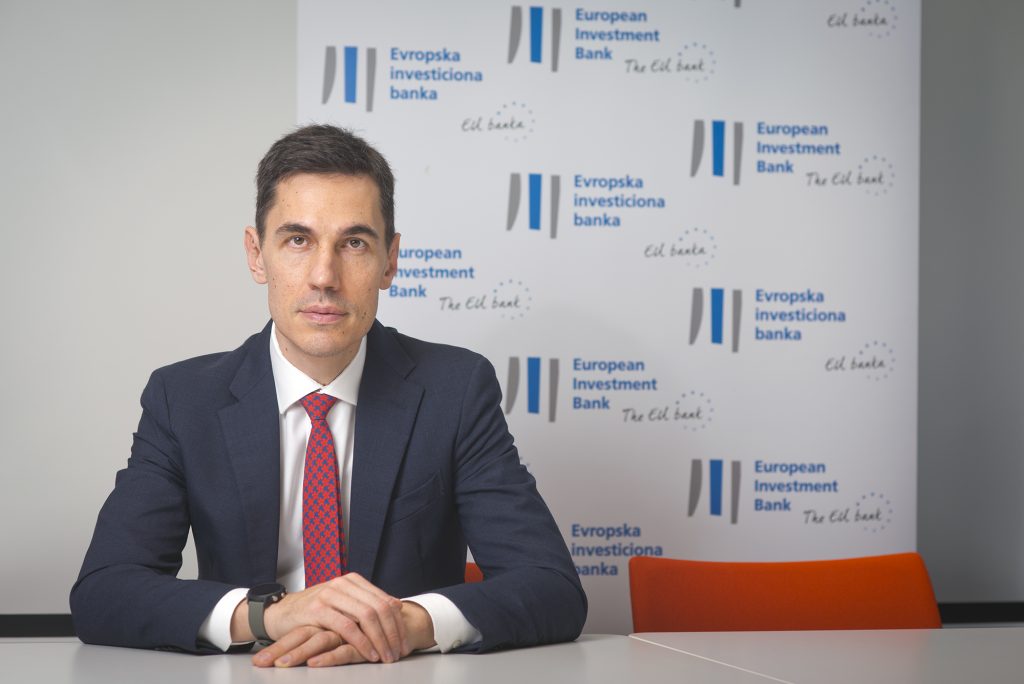* Exclusive interview *
Better connectivity and improved economic and trade relations are strongly welcomed by the EIB. As one of the strategic goals outlined in the Economic and Investment Plan, the creation of a common market in the region will facilitate integration into the EU value chain and production processes
“In times of global crisis such as the COVID-19 pandemic, we have seen that what enables industries and businesses to keep functioning is the continuity of supply chains. In this context, there is a huge development opportunity for the Western Balkans that can be enhanced by providing modern transport and digital and energy networks, as well as development of IT and innovation capacities, human capital and know-how. The EIB will step up its support for a better-connected WB in cooperation with EU-led Initiatives such as the Team Europe. These can contribute greatly and help create a more prosperous region, which is why we will work to support their implementation” said Alessandro Bragonzi, who is at the beginning of his term as the Head of the EIB Regional Representation for the Western Balkans.

Did you have any impressions of Belgrade before coming here, given that you are very familiar with the region because you covered Albania, North Macedonia and Kosovo* in the previous term?
Thank you for the opportunity to speak to Diplomacy & Commerce. Indeed, I am familiar with the region from my previous post and very glad to continue my career working in the Western Balkans from Belgrade. I expected a vibrant, cosmopolitan city and I am very happy these expectations were fully met. The Western Balkans region is known for its warm hospitality and I see that this holds true for Belgrade as well.
As the Serbian writer Momo Kapor once wrote: “This city will mesmerise you, while never revealing the code of that uncommon love that cannot be explained”. I am fascinated by the contrast of the old section of Belgrade and the rapidly developing New Belgrade, two worlds connected by the bridges crossing the Danube and Sava rivers, over the confluence of which you can admire the stunning view of the sunset from the edge of the park of the Kalemagdan fortress.
The city of Belgrade is one of the oldest cities in Europe and – alongside the whole of Serbia – has gone through a tremendous transformation over the last decade, and keeps thriving. At the same time, a number of challenges remains to be tackled, in particular concerning urban mobility, waste and wastewater management, and better energy efficiency of the city’s building stock.
All the above are areas where EIB can and is already providing support to Belgrade as well as other cities in Serbia.
This year seems to be just as challenging as last. What will be the priorities on your agenda in 2021?
I will have the responsibility and the opportunity to reinforce Team Europe’s efforts to fuel faster post-COVID-19 recovery in the region. As one of the largest multilateral investors in the region, the EIB can contribute significantly to its sustainable economic and social development. It will be a huge professional challenge to ensure the Western Balkans capitalises on recovery opportunities, moves forward with the green and digital transition and stays on its path to EU accession.
A major task for us will be support for the rollout of the European Commission’s Economic and Investment Plan (EIP), including its €9 billion in grants for strategic investments in sustainable development. This is a unique multi-billion euro opportunity to finance the digital and green transition, inclusive growth, sustainable transport and the creation of the common regional market. Moreover, this long-term sustainable financial support does not jeopardise the financial stability of the economies in the region. As the EU bank, we are ready to sustain the EIP with our affordable financing and technical advisory support to help mobilise the €20 billion in investments targeted by the plan. The aim is to make sure that the WB including Serbia can prepare as many projects as possible and attract investments, finance and grants into their local economies.
A major task for us will be support for the rollout of the European Commission’s Economic and Investment Plan (EIP), including its €9 billion in grants
Our focus will on the green and digital transition, improvement of healthcare capacities and the transportation network, especially in the sectors of urban, waterway and railway transport. We plan to continue financing environmental projects, such as the construction of water and wastewater infrastructure that will enable improved sanitation and access to drinking water. The EIB will start investing in more efficient and renewable energy resources.
On top of that, small and medium enterprises (SMEs) will continue benefiting from new credit lines facilitated by the EIB. In 2020, the EIB Group unlocked €320 million with some of the most favourable conditions on the market for small businesses across the region, in a year when they were facing unprecedented constraints in keeping themselves afloat, preserving jobs and raising liquidity. In Serbia, the EIB signed the first-ever impact loan that promotes inclusive employment, jobs for youth and women entrepreneurship. Under the COSME Digital Pilot Programme, the European Investment Fund, part of the EIB Group, signed the first guarantee agreement that supports business development and the digitalisation of SMEs. We expect to further scale up these kind of investments for the entire region.
Has the pandemic slowed down EIB projects, and which projects will the EIB focus on in Serbia and the region?
In spite of the pandemic, the EIB has demonstrated that it can work and deliver just as efficiently as in normal circumstances. From the very start of the COVID-19 crisis, to mitigate the economic fallout and address the most urgent needs in the healthcare and private sector, the EU bank introduced several key measures: (i) we offered a €1.7 billion financial package as part of the Team Europe support to the Western Balkans’ socioeconomic recovery; (ii) we have introduced exceptional, flexible disbursement of existing and new funds; and (iii) we offered technical advisory services to Western Balkans partners for preparing projects and increasing resilience and preparedness for future emergencies.
Our focus will on the green and digital transition, improvement of healthcare capacities and the transportation network
As a result of our robust and comprehensive set of measures, in 2020 the EIB Group mobilised over €1 billion for the region. On top of that, we doubled our investments compared to 2019 and provided €873 million, in loans and grants for new infrastructure projects and SME development.
In 2021, the EIB intends to continue our support for small and medium enterprises. New investments creating more accessible sources of financing for local SMEs will be signed soon. These investments will make Serbia an even more attractive location to do business.
How important is raising company awareness when it comes to sustainable development?
The combination of climate change and the destruction of ecosystems poses an increasing risk of environmental collapse with enormous human consequences. Environmental sustainability has become key to the way we do business in the post-COVID world. It implies growth that is socially and environmentally justified, and where the impact of economic activities on climate change is neutral.
In November 2020, the EIB Group published its Climate Bank Roadmap 2021-2025, which outlines our goals for climate finance that supports the European Green Deal and helps make Europe carbon-neutral by 2050. It maps the next stages in the journey to a sustainable planet and provides a framework to counter climate change.
As the EU climate bank, the EIB stands ready to support the Western Balkans’ green transition. Coal is still fundamental to the energy sector in the WB, accounting for around 70% of electricity produced in the region, and in some countries even 97%. Under the Green Agenda the transformation includes a more sustainable and inclusive economic model with more diverse and efficient energy resources, moving towards a full switch to renewable, carbon-neutral energy. This is a long-term process, but it has to start from somewhere and now is the right time to embrace the change. With its ground-breaking commitments on climate action, the EIB, as the EU climate bank, is well established as leading on expertise in the field thanks to its toolbox: advisory, financing and blending. This will help reduce air pollution and carbon footprints for the benefit of public health and better living conditions for people across the region.

What can Serbia expedite regarding reforms and the EU accession to make the economic environment more attractive for investors?
Moving forward with structural reforms and EU accession processes will help create more a reliable market that will attract new investments. These reforms are necessary for a more inclusive society and an economic transformation that will enable sustainability in the Serbian economy. The EIB welcomes reforms to public investment management and state-owned enterprises, which will make it possible to create a more private sector-oriented economy while improving judicial court efficiency, anti-corruption legislation and the rule of law.
These processes will generate a new, more stable business climate for investors to foster investments, job opportunities, competitiveness and growth. As the EU bank, we will continue to help the region to make these necessary reforms on the path to the EU, and help increase the connectivity and integration of the regional market with stronger trade and economic ties.
Forecasts
How will the ongoing crisis affect the financial aspects and the economy in 2021?
According to European Commission, economic activity recorded a strong rebound in the third quarter of 2020, reflecting the recovery from the spring 2020 lockdown period. The contraction of real GDP was very low in 2020 (0.9%), mostly thanks to pre-crisis economic growth, the structure of the Serbian economy and recovery measures introduced. However, real GDP in 2022 is expected to be 4 percentage points below pre-COVID-19 projections, according to estimates from the IMF. Until the economy rebound forecasted for 2022, there is another challenging year ahead, when it will be essential to stay on a recovery path despite the ongoing pandemic and financial constraints that companies and households are facing on a daily basis.
The EIB welcomes further strengthening of the public investment framework to accelerate implementation of new projects, crucial for bridging the infrastructure gap. Modern transport, energy and digital infrastructure will prepare Serbia for joining the common market to support competitiveness, foreign investments, alignment with the EU value chains and competitiveness in the global economy.
* This designation is without prejudice to positions on status, and is in line with UNSCR 1244/1999 and the ICJ Opinion on the Kosovo declaration of independence.